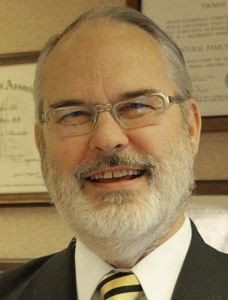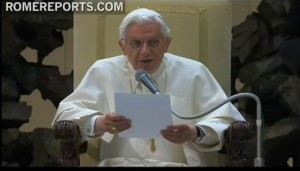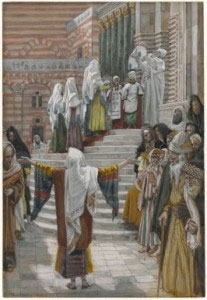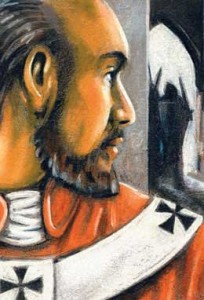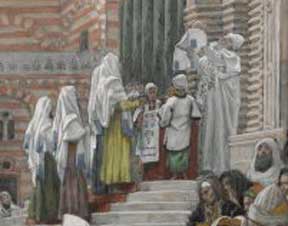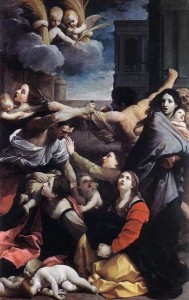Tags: catholic, catholic podcast, catholic prayer, cathollc spirituality
This entry was posted on Wednesday, January 4th, 2012 at 5:23 am
You can follow any responses to this entry through the RSS 2.0 feed.
Show 13–  Artificial Reproduction Technology
The many variations “assisted” reproduction technologies, which should truly been termed “artificial”. Why is the distinction important? What are the dangers morally, as well as physically? And why has infertility increased over the years?
“Your Fertility Care Consultâ€
with Dr. Thomas Hilgers, founder of the Pope Paul VI Institute
for The Study of Human Reproduction
hosted by Kris McGregor
[powerpress]
listen to the entire series at Dr. Hilger’s Discerning Hearts Page
The Pope Paul VI Institute, founded in 1985 by Thomas W. Hilgers, MD, is internationally recognized for its outstanding achievements in the field of natural fertility regulation and reproductive medicine — 30 years of scientific research and educational program development; allied health professional education programs for couples and professionals; professional, caring, and morally acceptable patient services. The Pope Paul VI Institute for the Study of Human Reproduction is building a culture of life in women’s health care through its major developments — Creighton Model FertilityCare System and NaProTechnology.
Tags: Artificial Reproduction Technology w/ Dr. Thomas Hilgers, catholic, catholic podcast, catholic prayer, cathollc spirituality, human reproduction, pope paul vi institute, thomas hilgers
This entry was posted on Monday, January 2nd, 2012 at 8:19 am
You can follow any responses to this entry through the RSS 2.0 feed.
Persecution of Catholics in England
[powerpress “faith-check-with-greg-youell”]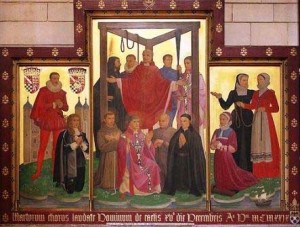
You’ve heard how the Pilgrims fled religious persecution in England, but have you ever heard how Catholics were persecuted there?
Recent scholarship such as Eamon Duffy’s book The Stripping of the Altars show that the vast majority of the English people did not freely choose to leave the Catholic Church, but were coerced into it. In fact, prior to King Henry VIII’s break with Rome, England was known throughout Europe as “Mary’s Dowry†because of its great piety. But under King Henry, Queen Elizabeth I, and others, failure to outwardly conform to the new state religion resulted in fines or imprisonment. Hiding a Catholic priest was considered a treasonable act punishable by death. Many suffered dearly, including famous martyrs like Sir Thomas More, or the 40 English martyrs that Pope John Paul II canonized.
Those openly professing Catholicism were barred from important positions in government and society well into the 1800s, and English law to this day prohibits a monarch from being Catholic.
Convincing evidence also shows that William Shakespeare was one such underground Catholic and that his plays included veiled appeals to the Queen for religious toleration.
So let us thank God that we can freely and openly practice our Faith, and honor all those who could not.
Tags: catholic, catholic podcast, catholic prayer, cathollc spirituality, england, martyrs of england
This entry was posted on Monday, January 2nd, 2012 at 7:16 am
You can follow any responses to this entry through the RSS 2.0 feed.
The app for iPad and iPhones devices can be found on iTunesÂ
The app for android devices on Google Play
Tags: catholic, catholic podcast, catholic prayer, cathollc spirituality, FREE APPS for iPhone, front page, iPad
This entry was posted on Sunday, January 1st, 2012 at 6:16 pm
You can follow any responses to this entry through the RSS 2.0 feed.
VATICAN CITY, 28 DEC 2011 (VIS) – Prayer in the Holy Family of Nazareth was the theme of Benedict XVI’s catechesis during today’s general audience, which was held in the Paul VI Hall in the presence of 7,000 pilgrims.
“The house of Nazareth”, the Pope explained, “is a school of prayer where we learn to listen, to meditate, to penetrate the deepest meaning of the manifestation of the Son of God, drawing our example from Mary, Joseph and Jesus”.
“Mary is the peerless model for the contemplation of Christ”, he said. She “lived with her eyes on Christ and treasured His every word. … Luke the Evangelist makes Mary’s heart known to us, her faith, her hope, her obedience, her interior life and prayer, her free adherence to Christ. All of these came from the gift of the Holy Spirit, which descended upon her just as it descended upon the Apostles according to Christ’s promise. This image of Mary makes her a model for all believers”.
Mary’s capacity to live by the gaze of God is “contagious”, the Holy Father went on. “The first to experience this was St. Joseph. … With 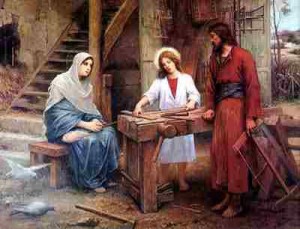 Mary, and later with Jesus, he began a new rapport with God, he began to accept Him into his life, to enter into His plan of salvation, to do His will”.
Mary, and later with Jesus, he began a new rapport with God, he began to accept Him into his life, to enter into His plan of salvation, to do His will”.
Although the Gospel has not preserved any of Joseph’s words, “his is a silent but faithful presence, constant and active. … Joseph fulfilled his paternal role in all aspects”. In this context, the Pope explained how Joseph had educated Jesus to pray, taking Him to the synagogue on Saturdays and guiding domestic prayer in the morning and evening. “Thus, in the rhythm of the days spent in Nazareth, between Joseph’s humble dwelling and his workshop, Jesus learned to alternate pray and work, also offering up to God the fatigue by which they earned the bread the family needed”.
Benedict XVI then turned his attention to the pilgrimage of Mary, Joseph and Jesus to the Temple in Jerusalem, as narrated in the Gospel of St. Luke. “The Jewish family, like the Christian family, prays in the intimacy of the home, but it also prays together in the community recognising itself as part of the pilgrim People of God”, he said.
Jesus’ first words – “Why were you searching for me? Did you not know that I must be in my Father’s house” – pronounced when Mary and Joseph found Him sitting among the teachers in the Temple, are a key to understanding Christian prayer. “From that moment, the life of the Holy Family became even richer in prayer, because the profound significance of the relationship with God the Father began to spread from the Heart of the boy (then adolescent, then young man) Jesus to the hearts of Mary and Joseph. The Family of Nazareth was the first model of the Church in which, in the presence of Jesus and thanks to His mediation, a filial rapport with God came to transform even interpersonal relations”.
“The Holy Family”, Benedict XVI concluded, “is an icon of the domestic Church, which is called to pray together. The family is the first school of prayer where, from their infancy, children learn to perceive God thanks to the teaching and example of their parents. An authentically Christian education cannot neglect the experience of prayer. If we do not learn to pray in the family, it will be difficult to fill this gap later. I would, then, like to invite people to rediscover the beauty of praying together as a family, following the school of the Holy Family of Nazareth”.
AG/VIS 20111228 (620)
Tags: catholic, catholic podcast, catholic prayer, cathollc spirituality, pope benedict xvi, prayer
This entry was posted on Sunday, January 1st, 2012 at 3:39 pm
You can follow any responses to this entry through the RSS 2.0 feed.
“The Word became flesh and dwelt among us”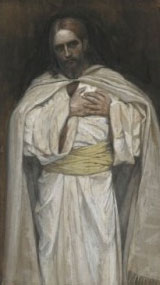
[powerpress]
an excerpt from today’s reflection by Don Schwager:
Christians never cease proclaiming anew the wonder of the Incarnation. The Son of God assumed a human nature in order to accomplish our salvation in it. The Son of God …worked with human hands; he thought with a human mind. He acted with a human will, and with a human heart he loved. Born of the Virgin Mary, he has truly been made one of us, like to us in all things except sin (Gaudium et Spes).
If we are going to behold the glory of God we will do it through Jesus Christ. Jesus became the partaker of our humanity so we could be partakers of his divinity (2 Peter 1:4). God’s purpose for us, even from the beginning of his creation, is that we would be fully united with Him. When Jesus comes God is made known as the God and Father of our Lord Jesus Christ. By our being united in Jesus, God becomes our Father and we become his sons and daughters. Do you thank the Father for sending his only begotten Son to redeem you and to share with you his glory?
“Almighty God and Father of light, your eternal Word leaped down from heaven in the silent watches of the night. Open our hearts to receive his life and increase our vision with the rising of dawn, that our lives may be filled with his glory and his peace.â€
for the full reflection visit : Daily Reading and Meditation
Tags: catholic, catholic podcast, catholic prayer, cathollc spirituality, don schwager, eternal word, gaudium et spes, gospel of john, son of god
This entry was posted on Saturday, December 31st, 2011 at 12:01 am
You can follow any responses to this entry through the RSS 2.0 feed.
“All who were looking for the redemption of Jerusalem”
[powerpress]
an excerpt from today’s reflection by Don Schwager:
What do you hope for? The hope which God places in our heart is the desire for the kingdom of heaven and eternal life as our happiness. Hope grows with prayer and perseverance. Anna was pre-eminently a woman of great hope and expectation that God would fulfill all his promises. Filled with the Holy Spirit, she was found daily in the house of the Lord, attending to the Lord in prayer and speaking prophetically to others about the Lord’s promise to send a redeemer. She is a model of godliness to all believers as we advance in age. Advancing age and the disappointments of life can easily make us cynical and hopeless if we do not have our hope placed rightly. Anna’s hope in God and his promises grew with age! She never ceased to worship God in faith and to pray with hope. Her hope and faith in God’s promises fueled her indomitable zeal and fervor in prayer and service of God’s people. How do we grow in hope? By placing our trust in the promises of Jesus Christ and relying not on our own strength, but on the grace and help of the Holy Spirit. Does your hope and fervor for God grow with age?
“Lord Jesus, may I never cease to hope in you and to trust in your promises. Inflame my zeal for your kingdom and increase my love for prayer, that I may never cease to give you praise and worship”.
for the full reflection visit : Daily Reading and Meditation
Tags: anna the prophetess, catholic, catholic podcast, catholic prayer, cathollc spirituality, don schwager, gospel of luke, octave of christmas, presentation in the temple
This entry was posted on Friday, December 30th, 2011 at 12:17 am
You can follow any responses to this entry through the RSS 2.0 feed.
And what would happen next………
.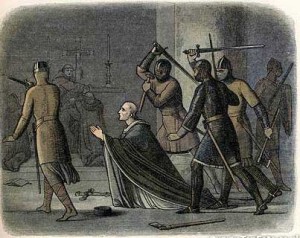
A strong man who wavered for a moment, but then learned one cannot come to terms with evil and so became a strong churchman, a martyr and a saint—that was Thomas Becket, archbishop of Canterbury, murdered in his cathedral on December 29, 1170.
His career had been a stormy one. While archdeacon of Canterbury, he was made chancellor of England at the age of 36 by his friend King Henry II. When Henry felt it advantageous to make his chancellor the archbishop of Canterbury, Thomas gave him fair warning: he might not accept all of Henry’s intrusions into Church affairs. Nevertheless, he was made archbishop (1162), resigned his chancellorship and reformed his whole way of life!
Troubles began. Henry insisted upon usurping Church rights. At one time, supposing some conciliatory action possible, Thomas came close to compromise. He momentarily approved the Constitutions of Clarendon, which would have denied the clergy the right of trial by a Church court and prevented them from making direct appeal to Rome. But Thomas rejected the Constitutions, fled to France for safety and remained in exile for seven years. When he returned to England, he suspected it would mean certain death. Because Thomas refused to remit censures he had placed upon bishops favored by the king, Henry cried out in a rage, “Will no one rid me of this troublesome priest!†Four knights, taking his words as his wish, slew Thomas in the Canterbury cathedral.
Thomas Becket remains a hero-saint down to our own times. From Saint of the Day
For a greater telling of this saint’s life – EWTN Library
Note: T. S. Eliot wrote a play — “Murder in the Cathedral” — about his life, and a movie — “Becket” (1964) — starring Peter O’Toole and Richard Burton has been made, too
Prayer for St. Thomas a Becket
Taken from the Roman Missal.
O God, for the sake of whose Church the glorious Bishop Thomas fell by the sword of ungodly men: grant, we beseech Thee, that all who implore his aid, may obtain the good fruit of his petition. Through our Lord Jesus Christ, Who livest and reignest with Thee in the unity of the Holy Spirit, forever and ever. Amen.
Tags: archbishop of Canterbury, Archishop of Canterbury, Canterbury cathedral, catholic, catholic podcast, catholic prayer, cathollc spirituality, Church, england, Henry II, martyr, matyrdom, middle ages, St. Thomas Becket, Thomas Becket
This entry was posted on Thursday, December 29th, 2011 at 5:19 am
You can follow any responses to this entry through the RSS 2.0 feed.
“This child is set for the fall and rising of many”
[powerpress]
an excerpt from today’s reflection by Don Schwager:
Simeon blessed Mary and Joseph and he prophesied to Mary about the destiny of this child and the suffering she would undergo for his sake. There is a certain paradox for those blessed by the Lord. Mary was given the blessedness of being the mother of the Son of God. That blessedness also would become a sword which pierced her heart as her Son died upon the cross. She received both a crown of joy and a cross of sorrow. But her joy was not diminished by her sorrow because it was fueled by her faith, hope, and trust in God and his promises. Jesus promised his disciples that “no one will take your joy from you” (John 16:22). The Lord gives us a supernatural joy which enables us to bear any sorrow or pain and which neither life nor death can take way. Do you know the joy of a life fully surrendered to God with faith and trust?
“Lord Jesus, may I recognize your visitation and be prepared for your action in my life today, just as Simeon Anna were prepared and ready to respond to your visitation and action in their day.”
for the full reflection visit : Daily Reading and Meditation
Tags: catholic, catholic podcast, catholic prayer, cathollc spirituality, don schwager, gospel of luke, octave of christmas, presentation in the temple, simeon
This entry was posted on Thursday, December 29th, 2011 at 12:27 am
You can follow any responses to this entry through the RSS 2.0 feed.
[powerpress] Â Msgr. Esseff not only laments the horror of the massacre of the Holy Innocents in Bethlehem 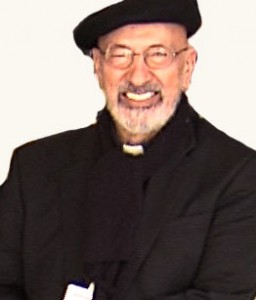 2000 years ago, but the tragedy of the continued holocaust of children within their mother’s womb that occurs
2000 years ago, but the tragedy of the continued holocaust of children within their mother’s womb that occurs 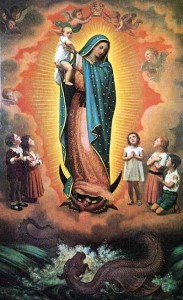 today.  He reflects on the passage from Revelation which recounts the hatred the devil has for the womb of the woman:  The enemy HATES life.  Msgr. Esseff reminds us of the VICTORY of Christ and discusses the forgiveness and hope found with God.  He shares the stories of two seperate women named Maria, both of whom touched his life and who can help show us the way.
today.  He reflects on the passage from Revelation which recounts the hatred the devil has for the womb of the woman:  The enemy HATES life.  Msgr. Esseff reminds us of the VICTORY of Christ and discusses the forgiveness and hope found with God.  He shares the stories of two seperate women named Maria, both of whom touched his life and who can help show us the way.
Tags: catholic, catholic podcast, catholic prayer, cathollc spirituality, msgr. john esseff
This entry was posted on Wednesday, December 28th, 2011 at 6:56 pm
You can follow any responses to this entry through the RSS 2.0 feed.
“The Feast of the Holy Innocents reminds us that shortly after the coming of Hope into the world, in the form of God as a new-born child, the fallen World has its own sickening and brutal response.
Some of the tragic news we hear each day echoes the inhuman tragedy of the massacre of the innocents. We witness the same kind of brutality that Herod unleashed on the innocent children of Judea every day in a myriad of unspeakable actions: murder, abortion, war, exploitation, slavery and countless other types of violence and oppression, much of which is against innocent children.
Herod’s actions are not only echoed in the extreme examples of evil cited above. In the actions of secularists, materialists and atheists, who seek to emulate Herod in their attempts to eradicate God from the world in favour of their own interests and agendas, we see various social effects manifesting that, in one way or another, enable a whole plethora of great and small evils to stir in men’s hearts.”– Traditio et Virtus
We remember today, O God, the slaughter of the holy innocents Of Bethlehem by King Herod. Receive, we pray, into the arms of your mercy all innocent victims; and by your great might frustrate the designs of evil tyrants and establish your rule of justice, love, and peace; through Jesus Christ our Lord, who lives and reigns with you and the Holy Spirit, one God, for ever and ever.
Tags: abortion war, catholic, catholic podcast, catholic prayer, cathollc spirituality, feast of the holy innocents, innocent children, massacre of the innocents
This entry was posted on Wednesday, December 28th, 2011 at 2:19 am
You can follow any responses to this entry through the RSS 2.0 feed.
“Rachel weeping for her children because they were no more”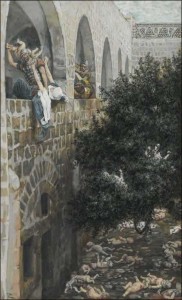
[powerpress]
an excerpt from today’s reflection by Don Schwager:
Who can explain suffering, especially the suffering of innocent children? Herod’s massacre of children who gave their lives for a person and a truth they did not know seemed so useless and unjust. What a scandal and stumbling block for those who can’t recognize God’s redeeming love. Why couldn’t God prevent this slaughter? Suffering is indeed a mystery. No explanation seems to satisfy our human craving to understand. What does Paul the Apostle mean when he says: We know that in everything God works for good with those who love him, who are called to his purpose (Romans 8:28)? These innocent children and their parents suffered for Christ. Suffering, persecution, and martyrdom are the lot of all who chose to follow Jesus Christ. There is no crown without the cross. It was through Jesus’ suffering, humiliation, and death on a cross, that our salvation was won. His death won life – eternal life for us. And his blood which was shed for our sake obtained pardon and reconciliation with our heavenly Father.
Suffering takes many forms: illness, disease, handicap, physical pain and emotional trauma, slander, abuse, poverty, and injustice. Jesus exclaimed that those who weep, who are reviled and persecuted for righteousness sake are blessed (Matthew 5:10-12). The word blessed [makarios in the Greek] literally means happiness or beatitude. It describes a kind of joy which is serene and untouchable, self-contained and independent from chance and changing circumstances of life. There is a certain paradox for those blessed by the Lord. Mary was given the blessedness of being the mother of the Son of God. That blessedness also would become a sword which pierced her heart as her Son died upon the cross. She received both a crown of joy and a cross of sorrow. But her joy was not diminished by her sorrow because it was fueled by her faith, hope, and trust in God and his promises. Jesus promised his disciples that “no one will take your joy from you” (John 16:22). The Lord gives us a supernatural joy which enables us to bear any sorrow or pain and which neither life nor death can take way. Do you know the joy of a life fully surrendered to God with faith and trust?
“Lord, you gave your life for my sake, to redeem me from slavery to sin and death. Help me to carry my cross with joy that I may willingly do your will and not shrink back out of fear or cowardice when trouble besets me.”
for the full reflection visit : Daily Reading and Meditation
Tags: catholic, catholic podcast, catholic prayer, cathollc spirituality, death, don schwager, emotional trauma, feast of the holy innocents, gospel of matthew, happiness, humiliation, injustice, innocent children, joy, love, martyrdom, suffering
This entry was posted on Wednesday, December 28th, 2011 at 12:40 am
You can follow any responses to this entry through the RSS 2.0 feed.
[powerpress] Â 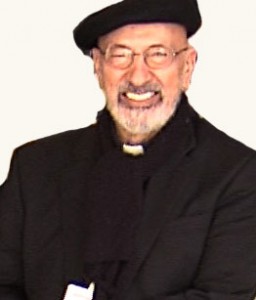 Msgr. Esseff, on his patronal feast day, discusses St. John the Evangelist. Â He recalls the message found in the Gospel of St. John, his letters, and stories from St. Polycarp. Â Msgr. Esseff discusses the relationship
Msgr. Esseff, on his patronal feast day, discusses St. John the Evangelist. Â He recalls the message found in the Gospel of St. John, his letters, and stories from St. Polycarp. Â Msgr. Esseff discusses the relationship 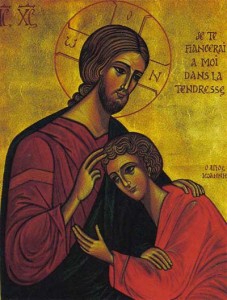 of Our Lady with John, and the gift Jesus made of her to John and to us all. Â He also shares how deeply the Sacred Heart is found in the teachings of St. John.
of Our Lady with John, and the gift Jesus made of her to John and to us all. Â He also shares how deeply the Sacred Heart is found in the teachings of St. John.
Tags: catholic, catholic podcast, catholic prayer, cathollc spirituality, Esseff, gospel of john, John Esseff, msgr. john esseff, St. John, the Gospel of St. John
This entry was posted on Tuesday, December 27th, 2011 at 8:53 am
You can follow any responses to this entry through the RSS 2.0 feed.
The importance of our family in faith, the Communion of Saints….Join Teresa Monag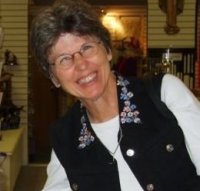 hen, of Pro Sanctity, as she offers a “Personal Plan for Holinessâ€. Listen along with these short, but beautiful meditations which encourage us tocontinue on our journey as “saints in the makingâ€!
hen, of Pro Sanctity, as she offers a “Personal Plan for Holinessâ€. Listen along with these short, but beautiful meditations which encourage us tocontinue on our journey as “saints in the makingâ€!
[powerpress]
Learn more about Pro Sanctity at www.prosanctity.org
Tags: catholic, catholic podcast, catholic prayer, cathollc spirituality, communion of saints, personal plan, pro sanctity, teresa monaghen
This entry was posted on Tuesday, December 27th, 2011 at 7:38 am
You can follow any responses to this entry through the RSS 2.0 feed.
John, the other disciple, who reached the tomb first, saw and believed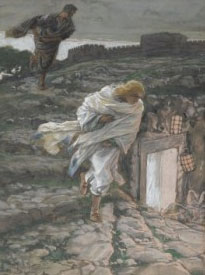
[powerpress]
an excerpt from today’s reflection by Don Schwager:
What was it like for those who encountered the Son of God in human form? John, the beloved disciple of Jesus, wrote his gospel as an eye-witness of the Word of God who became flesh and dwelt among us, and who died and rose for our salvation. John was the first apostle to reach the tomb of Jesus on Easter Sunday morning. Like the other disciples, he was not ready to see an empty tomb and to hear the angel’s message, Why do you seek the living among the dead (Luke 24:5)? What did John see in the tomb that led him to believe in the resurrection of Jesus? It was certainly not a dead body. The dead body of Jesus would have disproven the resurrection and made his death a tragic conclusion to a glorious career as a great teacher and miracle worker. When John saw the empty tomb he must have recalled Jesus’ prophecy that he would rise again after three days. Through the gift of faith John realized that no tomb on earth could contain the Lord and giver of life.
John in his first epistle testifies: What we have seen, heard, and touched we proclaim as the word of life which existed “from the beginning” (1 John 1:1-4). John bears witness to what has existed from all eternity. This “word of life” is Jesus the word incarnate, but also Jesus as the word announced by the prophets and Jesus the word now preached throughout the Christian church for all ages to come. One thing is certain, if Jesus had not risen from the dead and appeared to his disciples, we would never have heard of him. Nothing else could have changed sad and despairing men and women into people radiant with joy and courage. The reality of the resurrection is the central fact of the Christian faith. Through the gift of the Holy Spirit, the Lord gives us “eyes of faith” to know him and the power of his resurrection. The greatest joy we can have is to encounter the living Christ and to know him personally as our Savior and Lord.
“Lord Jesus Christ, you have triumphed over the grave and you have won new life for us. Give me the eyes of faith to see you in your glory. Help me to draw near to you and to grow in the knowledge of your great love and power.”
for the full reflection visit : Daily Reading and Meditation
Tags: catholic, catholic podcast, catholic prayer, cathollc spirituality, don schwager, Gospel John, gospel of john, john the beloved disciple, Lord Jesus Christ, resurrection of jesus, st john the evangelist, tomb of Jesus
This entry was posted on Tuesday, December 27th, 2011 at 12:09 am
You can follow any responses to this entry through the RSS 2.0 feed.

